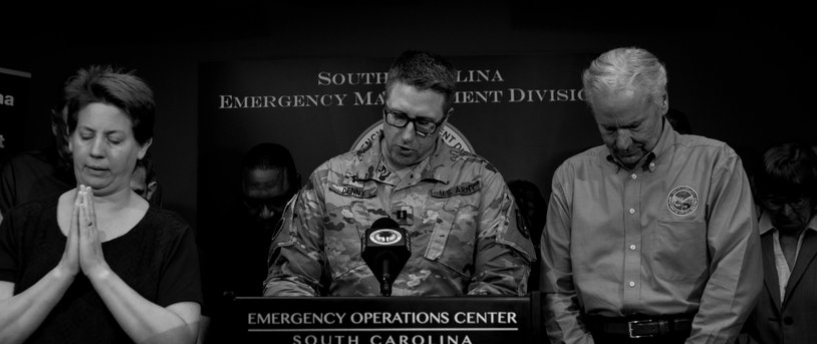
The Freedom From Religion Foundation is not blessing S.C. Gov. Henry McMaster’s imposition of prayers at official events.
Concerned South Carolina residents contacted FFRF about two such instances. At a Sept. 13 news conference about the government’s response to Hurricane Florence, McMaster invited South Carolina National Guard Captain/Chaplain John Denny to begin the press conference with a prayer. Denny was again asked on Sept. 16 to deliver a prayer before a press conference about the progress of Hurricane Florence. A still frame of a photograph of this prayer is currently the header photo on McMaster’s Twitter page.
“The decision to deliver a prayer at an official state news conference sends an unfortunate official message of endorsement of religion over nonreligion by the highest executive office in the state — a message that inevitably excludes many of your constituents, and has a proselytizing intent,” FFRF Co-Presidents Dan Barker and Annie Laurie Gaylor write to McMaster. “Asking Denny, a Christian chaplain, to preside over the prayer also signals an official message of endorsement of Christianity, thereby excluding followers of minority religions.”
A transcript of part of Denny’s Sept. 13 prayer follows:
Let us pray. Gracious God, we humble ourselves to you and ask for your help. Help us to exercise sound judgment in our preparations for the storm. Help us to be wise in our decisions. Help draw us closer to each other and strengthen our bonds within our communities and as a state through our care for one another. Help us to use this event as a rallying point for unity. Help keep us safe, O Lord. Help us to honor and praise you even in the midst of the storm. Lastly, help us to remember that the same God that created the heavens and the earth is the same God that is with us and will see us through the storm. We ask all these things in your gracious name, God. South Carolina strong, South Carolina proud. Amen.
Nonreligious Americans make up the fastest growing segment of the U.S. population by religious identification — more than one in five Americans now identifies as nonreligious, FFRF emphasizes. Among Millennials, those born after 1981, about 35 percent have no religious preference. Beginning a televised gubernatorial news conference with a prayer signals to this sizeable minority “that they are outsiders, not full members of the political community, and an accompanying message to adherents that they are insiders, favored members of the political community,” to quote the U.S. Supreme Court.
Government chaplains may only exist as an accommodation of a public employee’s religious beliefs when the government makes it difficult or impossible to seek out private ministries, FFRF reminds McMaster. This prayer did not lighten a government-government imposed burden on religion; rather it imposed a governmental religion on every citizen.
The bible itself remarks on the inappropriateness of public piousness. In the Sermon on the Mount, Jesus condemned public prayers as hypocrisy: “When you pray, do not be like the hypocrites, for they love to pray standing in the synagogues and on the street corners to be seen by others.” Matthew 6:5.
As governor of South Carolina, McMaster must remain cognizant that he has taken an oath to uphold and defend the U.S. Constitution — an entirely godless and secular document — and is charged with great responsibility over citizens, including those citizens who may not share his personal religious viewpoints. Leaving religion as a private matter for private citizens is the wisest public policy. Observing a strict separation of church and state offends no one and honors the First Amendment to the U.S. Constitution, FFRF concludes.
The Freedom From Religion Foundation is a nonprofit educational association of more than 31,000 nonreligious members across the country, including in South Carolina. FFRF’s purpose is to protect the constitutional principle of separation between state and church.